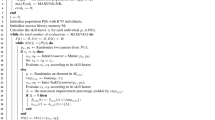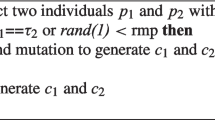Abstract
Evolutionary multitask optimization (EMTO) has developed fast recently, and many algorithms have emerged that solve several different problems simultaneously through knowledge transfer. Most algorithms use a single search operator in their processing. However, different tasks have distinct characteristics, and a single operator is often inadequate to adapt to different stages of the same task. In this paper, we propose a multiple search operator selection strategy by adaptive probability allocation, named adaptive multi-operator selection (AMOS) to address EMTO that features rapid convergence of populations. It can automatically select the best multiple search operators based on the characteristics of specific tasks and different stages of evolution. The primary contributions of the proposed algorithm are as follows: (1) It combines the basic concepts of multi-operator integration and adaptive search operator selection to select the best multiple search operators for each task at different evolutionary stages; (2) It facilitates the knowledge transfer through different solving operators between tasks; (3) It can be flexibly embedded into various frameworks of general EMTO algorithms with good results. In the experiments, we validate the performance of AMOS on CEC2017 benchmark suite, CMTOPs benchmark suite, and real-world EMTO problems, and experimental results demonstrate the effectiveness and generality of the proposed strategy.


















Similar content being viewed by others
Data Availability
The dataset analyzed during the current study is available from the [MTO-Platform] repository: [https://github.com/intLyc/MTO-Platform]. And AUC data from [https://www.csie.ntu.edu.tw/ cjlin/libsvmtools/datasets/]
References
Zhang F, Mei Y, Nguyen S, Zhang M, Tan KC (2021) Surrogate-assisted evolutionary multitask genetic programming for dynamic flexible job shop scheduling. IEEE Trans Evolut Comput 25(4):651–665
Huang Y, Feng L, Li M, Wang Y, Zhu Z, Tan KC (2023) Fast vehicle routing via knowledge transfer in a reproducing kernel Hilbert space. IEEE Trans Syst Man Cybern: Syst. https://doi.org/10.1109/TSMC.2023.3270308
Yang J-Q, Du K-J, Chen C-H, Wang H, Zhang J, Zhan Z-H (2023) Evolutionary multitasking bi-directional particle swarm optimization for high-dimensional feature selection. In: 2023 IEEE Congress on Evolutionary Computation (CEC), IEEE, pp 1–8
Feng L, Shang Q, Hou Y, Tan KC, Ong Y-S (2022) Multispace evolutionary search for large-scale optimization with applications to recommender systems. IEEE Trans Artif Intel 4(1):107–120
Zhou L, Feng L, Tan KC, Zhong J, Zhu Z, Liu K, Chen C (2020) Toward adaptive knowledge transfer in multifactorial evolutionary computation. IEEE Trans Cybern 51(5):2563–2576
Xue Y, Zhu H, Liang J, Słowik A (2021) Adaptive crossover operator based multi-objective binary genetic algorithm for feature selection in classification. Knowl-Based Syst 227:107218
Yang X, Li H (2023) Multi-sample learning particle swarm optimization with adaptive crossover operation. Math Comput Simul 208:246–282
Tian Y, Li X, Ma H, Zhang X, Tan KC, Jin Y (2022) Deep reinforcement learning based adaptive operator selection for evolutionary multi-objective optimization. IEEE Trans Emerg Topics Comput Intell. https://doi.org/10.1109/TETCI.2022.3146882
Durgut R, Aydin ME, Atli I (2021) Adaptive operator selection with reinforcement learning. Inf Sci 581:773–790
Wang C, Xu R, Qiu J, Zhang X (2020) AdaBoost-inspired multi-operator ensemble strategy for multi-objective evolutionary algorithms. Neurocomputing 384:243–255
Li K, Fialho A, Kwong S, Zhang Q (2013) Adaptive operator selection with bandits for a multiobjective evolutionary algorithm based on decomposition. IEEE Trans Evol Comput 18(1):114–130
Da B, Ong Y.-S, Feng L, Qin AK, Gupta A, Zhu Z, Ting C.-K, Tang K, Yao X (2017) Evolutionary multitasking for single-objective continuous optimization: benchmark problems, performance metric, and baseline results. arXiv preprint arXiv:1706.03470
Li Y, Gong W, Li S (2022) Evolutionary constrained multi-task optimization: benchmark problems and preliminary results. In: Proceedings of the Genetic and Evolutionary Computation Conference Companion, pp 443–446
Li S, Gu Q, Gong W, Ning B (2020) An enhanced adaptive differential evolution algorithm for parameter extraction of photovoltaic models. Energy Convers Manage 205:112443
Li S, Gong W, Gu Q (2021) A comprehensive survey on meta-heuristic algorithms for parameter extraction of photovoltaic models. Renew Sustain Energy Rev 141:110828
Wang C, Wu K, Liu J (2022) Evolutionary multitasking AUC optimization. arXiv preprint arXiv:2201.01145
Wei T, Wang S, Zhong J, Liu D, Zhang J (2021) A review on evolutionary multitask optimization: trends and challenges. IEEE Trans Evol Comput 26(5):941–960
Gupta A, Ong Y-S, Feng L (2015) Multifactorial evolution: toward evolutionary multitasking. IEEE Trans Evol Comput 20(3):343–357
Wu S-H, Zhan Z-H, Tan KC, Zhang J (2022) Orthogonal transfer for multitask optimization. IEEE Trans Evol Comput 27(1):185–200
Lin W, Lin Q, Feng L, Tan KC (2023) Ensemble of domain adaptation-based knowledge transfer for evolutionary multitasking. IEEE Trans Evolut Comput. https://doi.org/10.1109/TEVC.2023.3259067
Jiang Y, Zhan Z-H, Tan KC, Zhang J (2023) Block-level knowledge transfer for evolutionary multitask optimization. IEEE Trans Cybern. https://doi.org/10.1109/TCYB.2023.3273625
Li Y, Gong W, Li S (2023) Evolutionary competitive multitasking optimization via improved adaptive differential evolution. Expert Syst Appl 217:119550
Han H, Bai X, Hou Y, Qiao J (2022) Multi-task particle swarm optimization with dynamic on-demand allocation. IEEE Trans Evolut Comput. https://doi.org/10.1109/TEVC.2022.3187512
Feng L, Zhou W, Zhou L, Jiang S, Zhong J, Da B, Zhu Z, Wang Y (2017) An empirical study of multifactorial PSO and multifactorial DE. In: 2017 IEEE Congress on Evolutionary Computation (CEC), IEEE, pp 921–928
Li Y, Gong W (2024) Multiobjective multitask optimization with multiple knowledge types and transfer adaptation. IEEE Trans Evolut Comput. https://doi.org/10.1109/TEVC.2024.3353319
Li G, Lin Q, Gao W (2020) Multifactorial optimization via explicit multipopulation evolutionary framework. Inf Sci 512:1555–1570
Chen Y, Zhong J, Feng L, Zhang J (2019) An adaptive archive-based evolutionary framework for many-task optimization. IEEE Trans Emerg Top Comput Intell 4(3):369–384
Verheul J (2020) The influence of using adaptive operator selection in a multiobjective evolutionary algorithm based on decomposition. Master’s thesis
Fialho Á, Da Costa L, Schoenauer M, Sebag M (2010) Analyzing bandit-based adaptive operator selection mechanisms. Ann Math Artif Intell 60(1–2):25–64
DaCosta L, Fialho A, Schoenauer M, Sebag M (2008) Adaptive operator selection with dynamic multi-armed bandits. In: Proceedings of the 10th Annual Conference on Genetic and Evolutionary Computation, pp 913–920
Pavai G, Geetha T (2016) A survey on crossover operators. ACM Comput Surv (CSUR) 49(4):1–43
Zhou L, Feng L, Liu K, Chen C, Deng S, Xiang T, Jiang S (2019) Towards effective mutation for knowledge transfer in multifactorial differential evolution. In: 2019 IEEE Congress on Evolutionary Computation (CEC), IEEE, pp 1541–1547
Qin AK, Huang VL, Suganthan PN (2008) Differential evolution algorithm with strategy adaptation for global numerical optimization. IEEE Trans Evolut Comput 13(2):398–417
Zainuddin FA, Abd Samad MF, Tunggal D (2020) A review of crossover methods and problem representation of genetic algorithm in recent engineering applications. Int J Adv Sci Technol 29(6s):759–769
Bessaou M, Siarry P (2001) A genetic algorithm with real-value coding to optimize multimodal continuous functions. Struct Multidiscip Optim 23:63–74
Herrera F, Lozano M, Sánchez AM (2003) A taxonomy for the crossover operator for real-coded genetic algorithms: an experimental study. Int J Intell Syst 18(3):309–338
Deb K, Agrawal RB et al (1995) Simulated binary crossover for continuous search space. Complex Syst 9(2):115–148
Kubicki M, Figurowski D (2018) An introduction to a novel crossover operator for real-value encoded genetic algorithm: Gaussian crossover operator. In: 2018 International Interdisciplinary PhD Workshop (IIPhDW), IEEE, pp 85–90
Wolpert DH, Macready WG (1997) No free lunch theorems for optimization. IEEE Trans Evolut Comput 1(1):67–82
Zheng X, Qin AK, Gong M, Zhou D (2019) Self-regulated evolutionary multitask optimization. IEEE Trans Evol Comput 24(1):16–28
Li Y, Gong W, Li S (2023) Multitasking optimization via an adaptive solver multitasking evolutionary framework. Inf Sci 630:688–712
Bali KK, Ong Y-S, Gupta A, Tan PS (2019) Multifactorial evolutionary algorithm with online transfer parameter estimation: MFEA-II. IEEE Trans Evolut Comput 24(1):69–83
Liang Z, Zhang J, Feng L, Zhu Z (2019) A hybrid of genetic transform and hyper-rectangle search strategies for evolutionary multi-tasking. Expert Syst Appl 138:112798
Hashimoto R, Ishibuchi H, Masuyama N, Nojima Y (2018) Analysis of evolutionary multi-tasking as an island model. In: Proceedings of the Genetic and Evolutionary Computation Conference Companion, pp 1894–1897
Xue X, Zhang K, Tan KC, Feng L, Wang J, Chen G, Zhao X, Zhang L, Yao J (2020) Affine transformation-enhanced multifactorial optimization for heterogeneous problems. IEEE Trans Cybern 52(7):6217–6231
Deb K, Pratap A, Agarwal S, Meyarivan T (2002) A fast and elitist multiobjective genetic algorithm: NSGA-II. IEEE Trans Evolut Comput 6(2):182–197
Funding
This work was supported by: (1) the National Natural Science Foundation of China under Grant 62176146, 62272384; (2) the National Social Science Foundation of China under Grant 21XTY012; (3) the National Education Science Foundation of China under Grant BCA200083; (4) Key Project of Shaanxi Provincial Natural Science Basic Research Program under Grant 2023-JC-ZD-34.
Author information
Authors and Affiliations
Contributions
All the authors contributed to the conception and design of the study. Material preparation, data collection and analysis were performed by ZW, XD, LW and ZW. The first draft of the manuscript was written by LW, ZW and QJ, who commented on previous versions of the manuscript. All the authors read and approved the final manuscript.
Corresponding author
Ethics declarations
Conflict of interest
The authors declare that they have no known competing financial interests or personal relationships that could have appeared to influence the work reported in this paper.
Ethical and Informed Consent for the Utilized Data
The dataset used is open source and can be accessed at [https://github.com/intLyc/MTO-Platform].
Additional information
Publisher's Note
Springer Nature remains neutral with regard to jurisdictional claims in published maps and institutional affiliations.
Rights and permissions
Springer Nature or its licensor (e.g. a society or other partner) holds exclusive rights to this article under a publishing agreement with the author(s) or other rightsholder(s); author self-archiving of the accepted manuscript version of this article is solely governed by the terms of such publishing agreement and applicable law.
About this article
Cite this article
Wang, Z., Wang, L., Jiang, Q. et al. Multiple search operators selection by adaptive probability allocation for fast convergent multitask optimization. J Supercomput (2024). https://doi.org/10.1007/s11227-024-06016-w
Accepted:
Published:
DOI: https://doi.org/10.1007/s11227-024-06016-w




